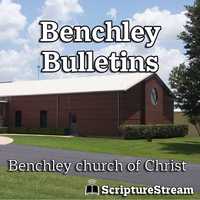“For a day in thy courts is better than a thousand. I had rather be a doorkeeper in the house of my God, than to dwell in the tents of wickedness.” (Psalms 84:10) This statement demands at least four characteristics of the person sincerely making it. Ask self – can I sincerely and objectively make this statement?
It demands knowledge.
One could not know if he had rather be a door keeper in the house of God if he did not know what it is. So, let us identify the house of God: “But if I tarry long, that thou mayest know how thou oughtest to behave thyself in the house of God, which is the church of the living God, the pillar and ground of the truth.” (I Timothy 3:15) The statement modified is I had rather be a doorkeeper in the church of my God than to dwell in the tents of wickedness. Thus, those who obey the gospel and live godly lives compose the church of my God. Door keeping necessitates service.
Now let us take a look at the tents of wickedness to see if we want to give them up or be a doorkeeper. Tents of wickedness refer to anything that comes from a carnal mind. Let us look at the results to see if we want to make that choice. The carnal mind leads to death (hell). The spiritual mind leads to life and peace (Romans 8:6). What choice do you make?
It demands discernment – good judgment.
Even the man in the world who has good judgment in business matters usually acts foolish relative to the soul. Good judgment is attained by application and exercise, “…who by reason of use have their senses to discern good and evil.” (Hebrews 5:8). The person who does not see wrong in drinking and dancing and missing Bible class and Wednesday night service, cannot correctly make this statement.
It demands a positive choice.
One can have knowledge and be able to discern good and evil yet make the wrong choice. Moses not only refused to remain in the king’s house, he chose to suffer with God’s people (Hebrews 11:24-26). Those who have “respect to the recompense of reward” will make the right choice also. When one makes a positive choice to serve in the house of God, he will not only refrain from evil, he will actively do the right. When one makes the positive choice to be a doorkeeper in the house of God, he will have the reward.
It demands humility.
Keeping doors is a position of low esteem. The high look down on door keeping. They want to do something big. If some cannot do something big, they will do nothing at all. Naaman (2 Kings 5:13) is a good example of this. One may say if I was a preacher or had much money, I would do great things for the Lord. The truth is one would do with would much exactly what he does with the little he does have. The humble realize their dependence on God. A congregation could not be divided if it was composed of truly humble people. Humble people depend upon God for direction, and they think of the welfare of others (Philippians 2:3-4).
Being a doorkeeper in the house of God takes much faith and much effort. Is it worth it? Psalms 84:11 gives the answer. “For the Lord is a sun and a shield; the Lord will give grace and glory: no good thing will He withhold from them that walk uprightly.” I repeat “no good thing will He withhold from them who walk uprightly.”
Jesse Jenkins




